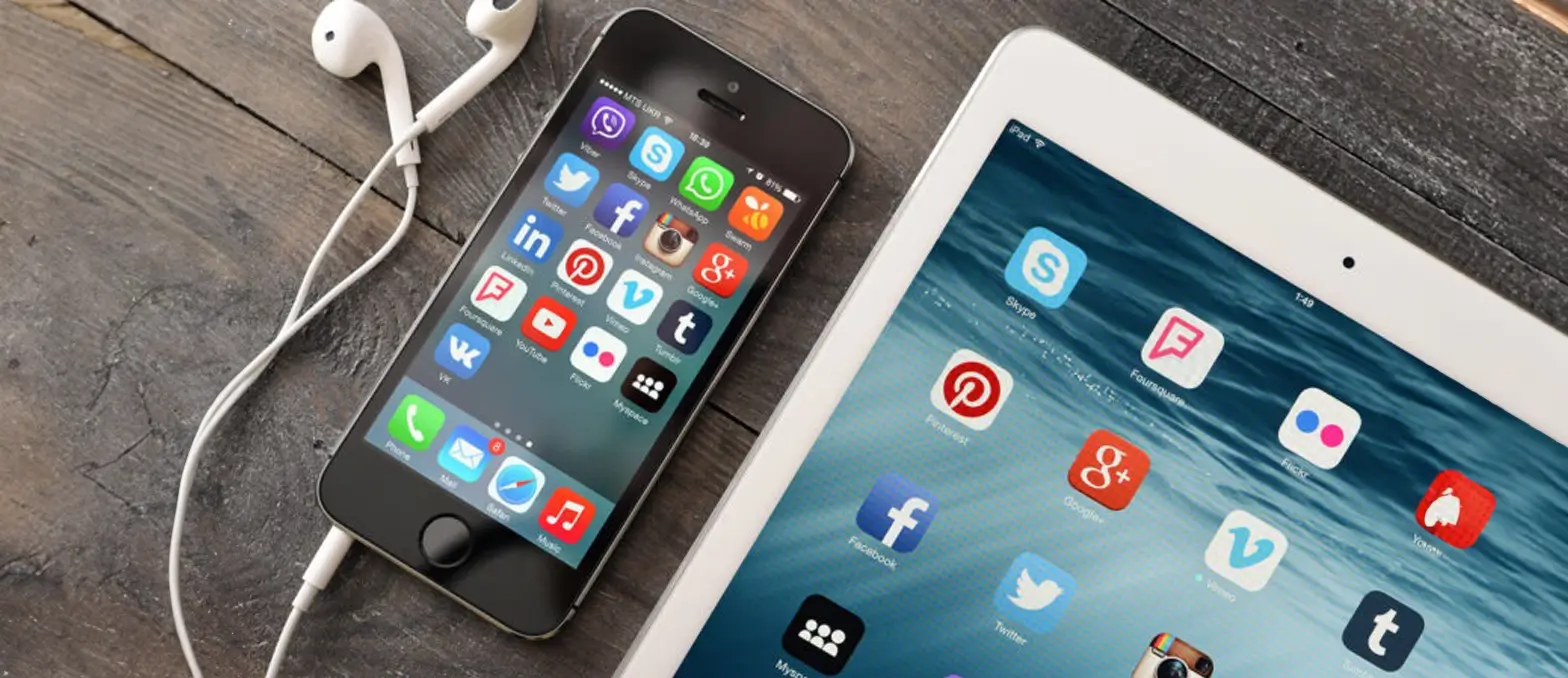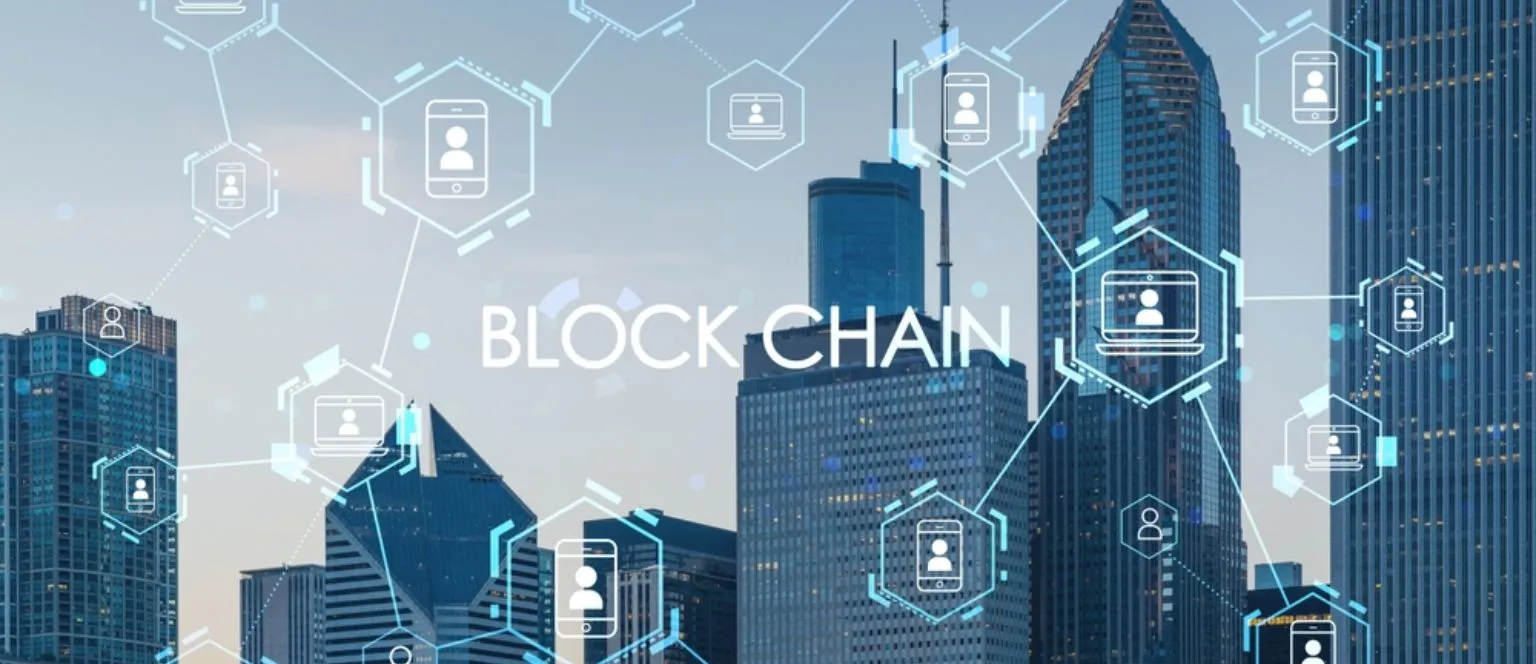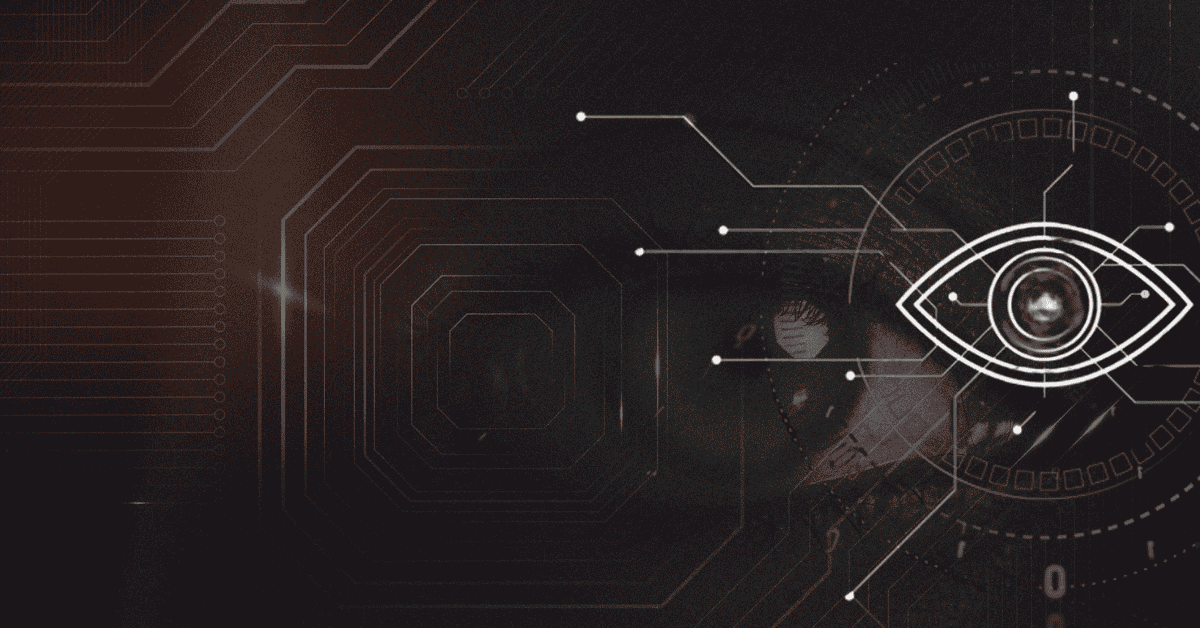Table of Contents
Global Positioning System (GPS) or location tracking app services have changed the way we move around. It helps us track assets, manage them and improve logistics. As technology advances new app trends and ingenuous techniques are emerging in the area of GPS tracking. This promises more exciting possibilities in the near future.
From Augmented Reality and Artificial Intelligence in 5G connectivity to wearable technology, the latest developments can change our interactions. These applications utilize the capabilities of GPS, Wi-Fi, cellular networks, and other technologies in custom app development services. All this is done to provide accurate and up-to-date location information.
Here in this post, we are going to discuss every aspect in terms of location tracking apps. This can help you proceed ahead with complete clarity. Read on.
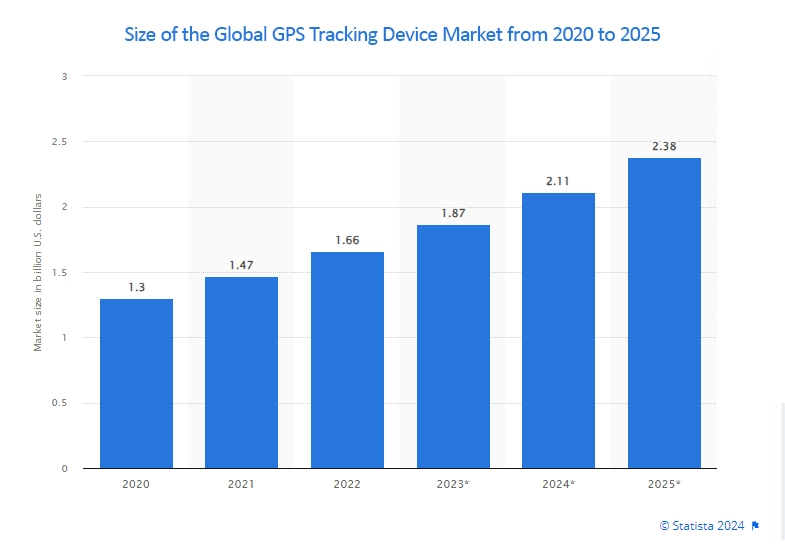
Location Tracking Apps: A Detailed Overview
When it comes to Location tracking apps, it monitors and records the geographical location of a device or individual. Location trackers monitor the movement of objects and people. The map application such as Google Maps or a navigation app finds directions to an address. This means you’ve the technology to track your location.
The best location tracking app leverages a combination of GPS, Wi-Fi, cellular networks, and other technologies. All this can determine the precise location coordinates. Location tracking apps make use of the GPS technology in order to determine the exact location of devices.
GPS is an electronic navigation system composed of satellite networks interconnected. Each satellite transmits signals to earth, where GPS receivers can join these signals and analyse the send-and-receive times. With this the app can determine the distance between the satellite to the computer that the app is installed on. With this information, the app determines the exact whereabouts that the gadget is.
The system will monitor, record and even share the location data of any device in the globe in real-time. It is done not only for tablets and smartphones, but also for pets and vehicles.
Globally, the GPS market is forecast to reach $3,131.1 million by the year 2025. And, by 2034 it will reach 7,228 million dollars. Hopefully, now you have got complete clarity of what location tracking app is all about. Now, let’s understand the importance it brings into play.
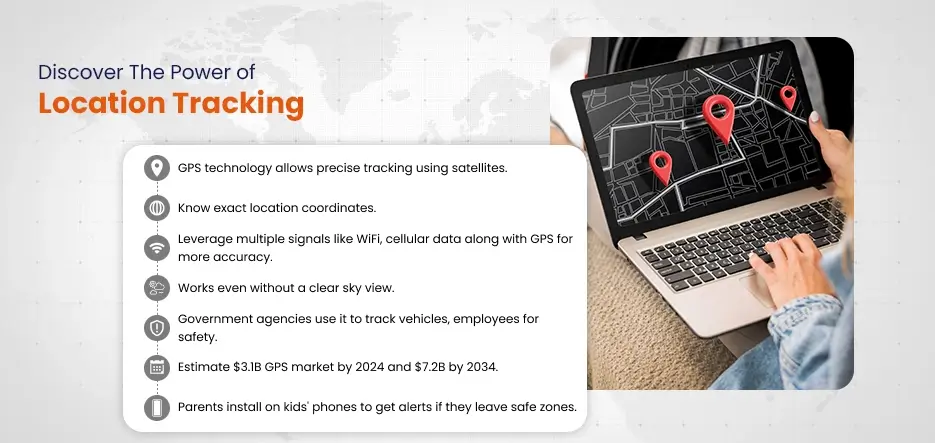
Benefits It Brings into Play
The location tracking app can enhance our lives in a variety of ways. It aids us in getting from point A to B and makes keeping track of the family members much simpler. This app also lends assistance for emergency assistance. Here are a few of the numerous ways apps for sharing location and their functionality can enhance our lives every day:
- Track and locate stolen or lost smart devices
- You can share your location with emergency services whenever you dial police
- You can route yourself around the traffic
- Beware of credit card fraud while traveling
- Make sure children are safe at home and school
- Get public health alerts
Importance And Growth of Location Tracking
Below are the aspects that show the rising importance of location tracking apps as per given by the top mobile app development companies in USA. Check it out.
Enhancing Personal Safety and Security
Real time location tracking apps can play an important role in providing security and safety for your personal.
Streamlining Business Operations
As per the reports, the market size of GPS tracking devices is predicted to be estimated at USD 3.38 billion by 2025. This will show the compound annual growth rate (CAGR) in the range of 11.58 percent over the forecast time. Location tracking apps can play an important role in providing security and safety for your personal.
Enabling Geolocation-Based Services
Location tracking apps are now indispensable tools for companies across sectors. They help with effective fleet management and asset tracking and optimize the efficiency of your workforce. By tracking the whereabouts of equipment, vehicles and staff, businesses can increase efficiency of their operations, decrease costs, and enhance the quality of service to customers.
Current Trends in Location Tracking Apps
Increased Accuracy of Location Tracking
Advancements in technology have led to significant improvements in the accuracy of the best free location tracking app.
Real-time Location Sharing
Real-time location sharing has become popular with users of location tracking apps. These apps let people communicate their exact location to specific people as well as groups of people for a specified time. Location sharing in real-time is helpful for scheduling gatherings, tracking the locations of family members, or for providing information about the status of travel. Privacy controls and custom sharing settings provide users with complete control over their personal location
Predicted Growth in Location-based Social Apps
Check-ins and Reviews
Social apps that are based on location are likely to gain popularity due to the need for social connections and personal recommendations. Users can sign-in at a variety of places like eateries, landmarks or even at events, and then share their experiences with review and rating. These apps let users discover new places, make connections with others who share the same interests and build the social scene.
Finding Friends and Events Nearby
The future of location tracking apps or employee location tracking apps includes features that allow users to find friends and events in their vicinity. With the help of real-time location information These apps can recommend local friends and social gatherings, concert venues and other events that are of interest. This encourages social interaction and facilitates meet-ups on a regular basis, and improves the overall experience for the user.
Location Tagging and Stories
Stories and location tagging are expected to be integral elements of social apps that are based on location. Users can add their locations in posts photos, videos, or posts to create a contextualized geographical story. The stories could be shared among family, friends or followers, as well as the entire app community which allows the users to talk about their stories and discovers in a visually engaging and socially interactive manner
Increased usage of Indoor Location Tracking
Indoor Mapping
Indoor mapping is expected to change the way that people navigate in complex indoor spaces like airports, shopping malls, hospitals, and other large spaces.
Navigation Inside Malls, Airports, etc.
Location tracking applications are expected to provide seamless navigation in malls, airports and other major places. Combining indoor mapping with real-time tracking of location, users get turn-by-turn directions to find specific gates or stores and get information on nearby promotions or services. This increases convenience, eases stress during navigation and enhances overall satisfaction of the user.
Indoor Beacon Technologies
The use of indoor beacons like Bluetooth Low Energy (BLE) beacons, are growing in popularity in apps for location tracking. They emit signals that are recognized by smartphones, which allows exact indoor location. Location tracking applications can make use of these beacons to offer customized offers, location-based notifications as well as other services that are based on location in indoor areas. iBeacon app development is used in hospitality, retail as well as healthcare.
Anonymous and Profile Less Location Tracking
Metadata-Based Inferences
In the future, the best app for location tracking may evolve to offer anonymous and profile less location tracking options. Instead of tracking individuals’ identities These apps are able to focus on analysing the location metadata to gain information and provide useful services. Through the aggregation and anonymization of location information, app developers are able to detect patterns, analyse the behaviour of crowds and make informed decisions without jeopardizing privacy for users.
Non-Personalized Recommendations
To combat privacy concerns, applications for location tracking could move toward offering non-personalized recommendations. Instead of relying on personal profile and preferences, they may make use of location data to give general suggestions based on current patterns, local events, or the general behaviour of people in a particular region. This allows for personalised experiences that do not compromise privacy or security of data.
Integration with Other Technologies
Augmented Reality Experiences
The integration of applications for tracking location with Augmented Reality (AR) technology can open up possibilities to experience immersive and engaging experiences. Through the combination of real-time location information along with AR overlays, the users are able to get information specific to their location such as directions, information, and even virtual objects around them. For instance, visitors can utilize AR-enabled tracking apps to look up historical information regarding landmarks, or locate local points of interest.
Internet of Things and Voice Assistants
Users can interact with the location tracking applications using voice commands, providing hands-free navigation, sharing of locations and access to services that are based on location. Furthermore, data on location from IoT devices, like smart home sensors, wearables or IOT app development could improve the accuracy and relevance of information based on location.
Blockchain for Location Data Transactions
Blockchain technology can be utilized to improve the security, transparency and credibility of location data transactions. Utilizing blockchain-based smart contracts application, location tracking software allow secure and distributed data exchange between users companies, as well as service providers. This makes sure that the location data is secure and safe, reducing the chance of data breaches, and allows users to exercise more access to their own personal data.
New Methods of Location Data Monetization
Analytics and Insights
Location-tracking apps generate huge quantities of data that can be useful for companies and companies. Through the analysis of location information, businesses can learn about consumer behavior as well as foot traffic patterns as well as market developments. Also, the information gained can be used to enhance the business strategy, improve efficiency in operations, and make decisions based on data.
Micro-Transactions and Rewards
Location tracking apps can allow micro-transactions as well as rewards based on location and behavior. For example, customers can earn discounts or rewards by visiting specific places and making purchases or engaging in activities that are based on location. The gamification aspect of location-tracking apps encourages loyalty and engagement while also allowing businesses to boost the number of people who walk through their doors and boost customer retention.
Growth In Location-Based Workplace Apps
Employee Tracking and Attendance
Location tracking apps are becoming increasingly used in workplace settings to monitor the attendance of employees, track productivity, and ensure security. Employers can accurately record the hours worked by employees and track their locations in their workplace and help streamline procedures for managing attendance. This improves accountability, enhances employee management, and improves the overall efficiency of operations
Facility Management and Optimization
Location tracking apps can be used for the management of facilities and optimization across a variety of industries. By tracking the exact location of equipment, assets, and staff in a facility, companies can maximize the allocation of resources, improve processes, and enhance maintenance procedures. Real-time location information can be used to make proactive decisions to reduce downtime and improve efficiency of operations.
Collaboration and Communications
Workplace apps that are location-based help to facilitate communication and collaboration among employees who share a physical space. They allow employees to connect with colleagues according to their current location, which helps to foster collaboration and teamwork. Furthermore, these apps can provide information in context and notifications that pertain to specific work areas, which can improve efficiency and task coordination.
Increased Privacy and Data Security
Purpose Limitations for Data Collection
To protect your privacy, the location tracking applications will be required to put in place restrictions on the purpose of data collection. This means that data about location is collected and used only for legitimate reasons that are disclosed by the app’s user. With the implementation of purpose-specific limitations, the users will have more assurance that their location information is utilized responsibly and transparently.
Privacy by Design Approach
Location-tracking apps should take a privacy-by-design strategy, which entails the integration of privacy and data protection measures into the design and development processes right from the start. This ensures privacy concerns are taken into consideration and data protection features are included as a default. Also, by incorporating privacy considerations into the fundamental structure of these apps the user’s data is protected throughout its entire lifecycle.
Data Minimization and Granular Consents
To protect data Location tracking apps should employ data minimization techniques that only collect the essential information needed to meet the intended function of the app. Furthermore, apps should offer users the ability to control their privacy settings and allow users to select the kinds of information about their locations they wish to share with whom. This allows users to exercise more privacy over personal data and provides more transparency and a better privacy-focused user experience
Location Analytics for Infrastructure Planning
Check out what it means to have location analytics for infrastructure planning as per the top mobile app development firm.
Urban Planning and Development
As per the top enterprise mobile app development experts, location-tracking apps can provide valuable insights for urban planning and development. By keeping a good track of location data, city planners can identify areas of high foot traffic, congestion, or underutilization.
Traffic Management and Public Transport
Location tracking applications are essential to managing traffic and public transportation optimization. By keeping track of the current traffic conditions and movements of travelers, transportation agencies can make educated choices to decrease congestion, enhance routing, and improve the effectiveness of the entire public transportation infrastructure. This also improves the quality of commutes for commuters and reduces environmental impact.
Emergency Response Management
Location tracking applications also assist in coordinating communications between emergency responders. This ensures quick and efficient emergency response. In times of emergency location tracking apps can aid in managing the emergency response. By providing real-time information about the exact location of people affected, emergencies can plan their responses efficiently assign resources, and provide immediate assistance to the people who require it.
Location Tracking in Drone Delivery and Logistics
The below aspects show what leading mobile app development companies think about location tracking in drone delivery.
Inventory Management and Warehousing
Location tracking applications are essential in the efficient control of inventory and warehousing in logistics and drone delivery operations. By capturing the location of drones, goods, and warehouse workers in real-time, companies can improve the storage of inventory, speed up fulfillment processes for orders, and ensure that the product is accurately monitored throughout supply chains. This also improves the efficiency of operations and improves customer satisfaction.
Last Mile Delivery Tracking
Location tracking applications allow precise tracking of delivery last mile with drone delivery service. Customers can follow exactly the location of their parcels in real time and receive alerts and information throughout the process of delivery. Additionally, this improves transparency, minimizes delivery mistakes, and offers a seamless customer experience.
Fleet Management and Job Dispatching
For drone delivery and logistics companies, location GPS tracking software are essential for fleet management and job dispatching. The apps allow businesses to track the location of their drones, the status, and the performance of their drone fleet. assign tasks to availability and proximity and also optimize the delivery routes to reduce fuel consumption and increase efficiency. Additionally, real-time location information allows businesses to make better decisions based on data and optimize their processes.
Steps To Develop Location Tracking App
According to the top iOS app development companies, below are the steps to develop a location-tracking app for your needs.
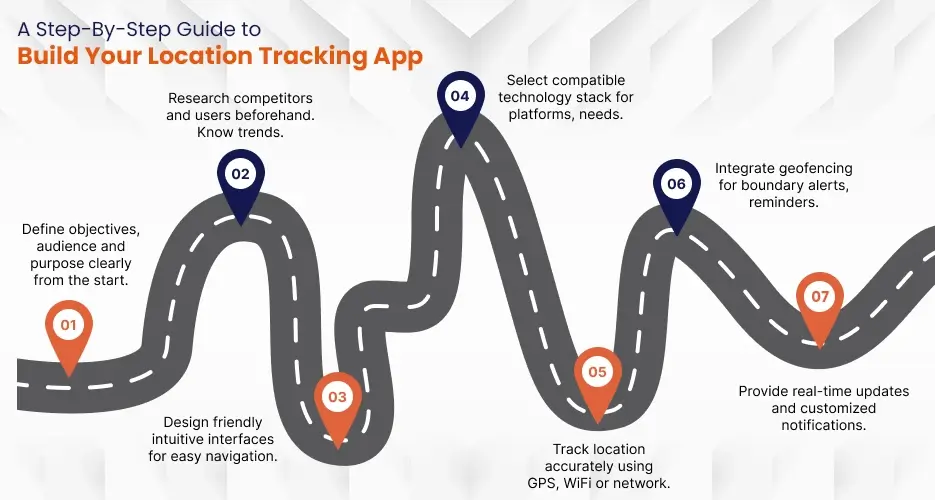
Define App Objectives
The first step to developing the app to track locations is to determine the goals of the app and its target user. Find out the primary purpose of the app, whether it’s intended for personal or business purposes or a mix of both. Also, determine the functions and features that the app should offer to meet the requirements of the user.
Conduct Market Research
Before beginning the process of development, conduct extensive market research to comprehend the competition in place and user expectations. Examine similar apps on the market, determine its strengths and weak points and gain insights into the preferences of users and trends. Also, this information can aid you in defining your app and ensure its viability in a highly competitive marketplace.
Design the User Experience
User experience (UX) design is a key factor in the success of a tracking application. Create user-friendly and easy-to-use interfaces that enable users to quickly navigate and access the features of the app. Also, take into consideration the different user types and their needs when creating the interface. Make sure to provide an easy and enjoyable experience that allows users to benefit from the application’s features.
Choose the Technology Stack
Picking the best programming languages is vital to the creation of a reliable and scalable app for tracking locations. Also, take into consideration factors like compatibility with platforms, performance requirements as well as future expansion capabilities. Based on the platform you are targeting (e.g., iOS, Android or web) pick the right frameworks, programming languages, and libraries to build your app.
Implement Location Tracking Functionality
The main function of a location tracking application is its ability to precisely keep track of and track the location of the user. Also, install location tracking using GPS as well as Wi-Fi or mobile network technologies, based on the resources available and the desired degree of precision. So, make sure that the feature of location tracking is effective, reliable, and adheres to the privacy preferences of the user.
Integrate Additional Features
To enhance the user experience and differentiate your app, consider integrating additional features as suggested by the top custom mobile application development company in the USA. Some popular features include:
Geofencing: Establish virtual boundaries and send alerts or actions when users enter or leave certain locations.
Real-time Updates: Offer users live location information and updates under their preferences and subscriptions.
Social Integration: Allow users to communicate their location with family, friends, or other social networks.
Customization Options: Users can personalize their experience on the app including choosing map styles and preferences, as well as making custom routes.
Offline Mode: Allow offline access which allows users to access maps previously downloaded and other data without having Internet access.
Testing and Deployment
Thoroughly test the app for functionality, usability, and performance. Conduct both manual and automated tests to identify and fix any bugs or issues. Also, once testing is complete, deploy the app to the respective app stores or web platforms without unwanted tracking standards. Ensure compliance with the platform-specific guidelines and regulations.
Features To Include in Location Tracking App
Below are the features that you can consider as per the top hybrid mobile app development experts in the business.
Real-time Location Tracking
The app must give real-time information about the user’s location and accuracy in displaying their movements on the map.
Geolocation Services
Use geolocation tools like address lookups, reverse geocoding, and location-based search to improve your user’s experience.
Navigation and Directions
Integration with navigational services, such as turn-by-turn directions alternative routes, and traffic information, is vital for users to get to their destination quickly.
Geofencing and Notifications
Geofencing allows the app to send out notifications or trigger actions whenever users enter or leave specific locations, which can improve the user’s experience and personalization.
Social Integration
Integrating social media lets users be connected and share the location with family, friends, or social networks, which will facilitate interactions with friends and family, as well as increase the utility of the app.
Customization Options
Give users the option of customizing options, such as maps styles, preferences, and customized routes, which allows users to customize the app to meet their requirements.
Offline Mode
Add offline capabilities, allowing people to open previously downloaded maps or data without internet access and ensuring continuous access to information related to locations.
Privacy and Security
Install robust security and privacy measures to guard the privacy of your user’s data and information about their location. Also, make sure that data collection is transparent and used, which allows users to choose your privacy options.
Costing of Location Tracking App Development
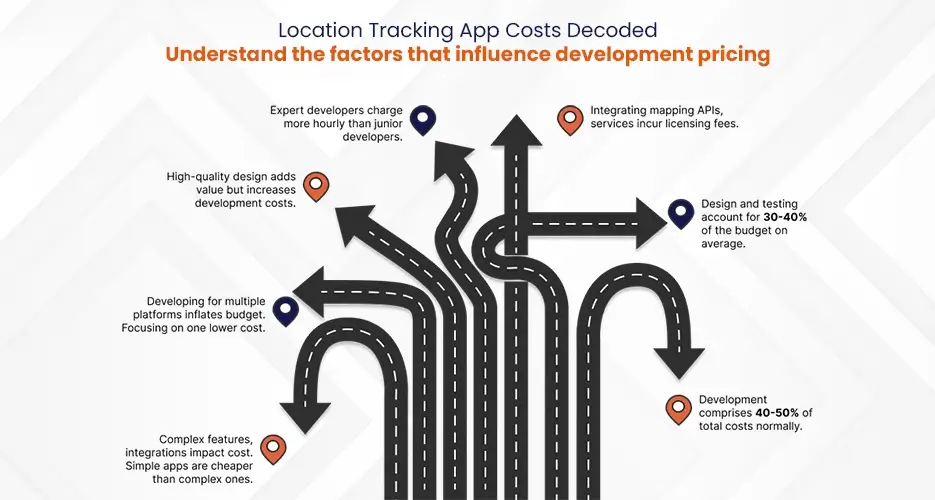
Factors Influencing App Development Cost
Several factors influence the mobile app development cost of location tracking needs. These include:
Complexity: Its complex application comprising its features, functions, and integration with other services, impacts the development costs.
Platform: The development of apps for multiple platforms (iOS, Android, web) will cost more money when compared to creating on a single platform.
The User Experience and Design: Making investments in top-quality UX style and aesthetics of interfaces can affect the cost of development.
Development Team: The size and the expertise that the team of developers together with their location, will affect the total development cost.
Third-Party Service Integration: Integrating third-party services, like geolocation APIs or mapping APIs could result in additional charges.
Cost Breakdown
The cost breakdown for location tracking app development typically includes:
- The design and user interface Design: This involves wireframing, design of UI/UX, and prototyping.
- Development: The costs of backend and frontend development include integration with APIs for location tracking and other services.
- Evaluation: Performing thorough tests and quality inspection to ensure a bug-free, solid application.
- Deployment: The process of deployment includes preparing the application to be distributed to app stores and other web platforms. It also involves the process of submitting and evaluating.
- Maintenance and Updates: Regular maintenance, repairs and updates are performed to ensure the software is current and compatible with all the latest OS versions.
Cost Optimization Strategies
As per on-demand app development company, to optimize the development cost of a location tracking app, consider the following strategies:
- Prioritize Features: Pay attention to important features and functions first and add more advanced features, based on customer feedback and the market demand.
- Agile Development Approach: Use an agile development method to simplify developing processes. It will also cut down on time spent on work, and improve allocation of resources.
- Make use of Open-Source Solutions: Use open-source frameworks, libraries, and tools to cut costs for development and speed up your development.
- Offshore Development: Consider offshore development teams or outsourcing specific jobs to lower development costs and maintain quality.
Conclusion and Future Prospects
The future of location-tracking apps is bright, thanks to constant technological advancements. All this is because of the growing demand for customized services that are based on location. As the expectations of customers change, developers must innovate and add new features. All they must work on is capabilities to remain ahead of the curve. Also, the combination of artificial intelligence, machine learning solutions, and AR has the potential to transform applications. This can be for tracking locations and providing users with more customized and rich experiences.
In addition, privacy and security of data will continue to be the top priorities. This requires app developers to consider the privacy of their users and adhere to the ever-changing laws. So, by staying on top of emerging trends and demands of users, applications for location tracking can play a major part in shaping the digital world. If you are in need of any assistance, connect with the experts at A3Logics. Good luck!
Book 30 Minutes Free Consultations with A3Logics Experts to Start Your App Journey Today!
FAQs
Q1. How accurate can indoor location tracking get?
Between 2020 and 2025, global GPS market size for tracking devices is expected to increase steadily. The accuracy of location tracking varies depending on the technology used. GPS-based Wi-Fi positioning, Bluetooth beacons, and sensor fusion techniques provide an extremely precise indoor location tracking in a matter of meters.
Q2. How to monetize location data?
Data from location can be used to earn money via targeted advertisements as well as promotions and offers. You could also make it by offering analysis based on location and business insight.
Q3. Which industries can use location tracking apps the most?
Industries like logistics and transportation, retailers, hospitality, tourism and healthcare and services on-demand are expected to utilize the tracking of locations extensively to improve their operations, customer experience and services.
Q4. How to find the top location tracking app development company?
To find the top location tracking cross platform mobile app development company, consider different factors. This includes their expertise in creating similar apps, their knowledge of relevant technologies, customer reviews and testimonials, a portfolio of previous projects and their ability to comprehend and meet your requirements.
Q5. What is the average costing of location tracking app development service?
Location tracking mobile app development services in USA come with costing that vary based on different factors. This includes the complexity of the application as well as desired features, compatibility with platform development time, as well as location of the development company. location for the developer company.



